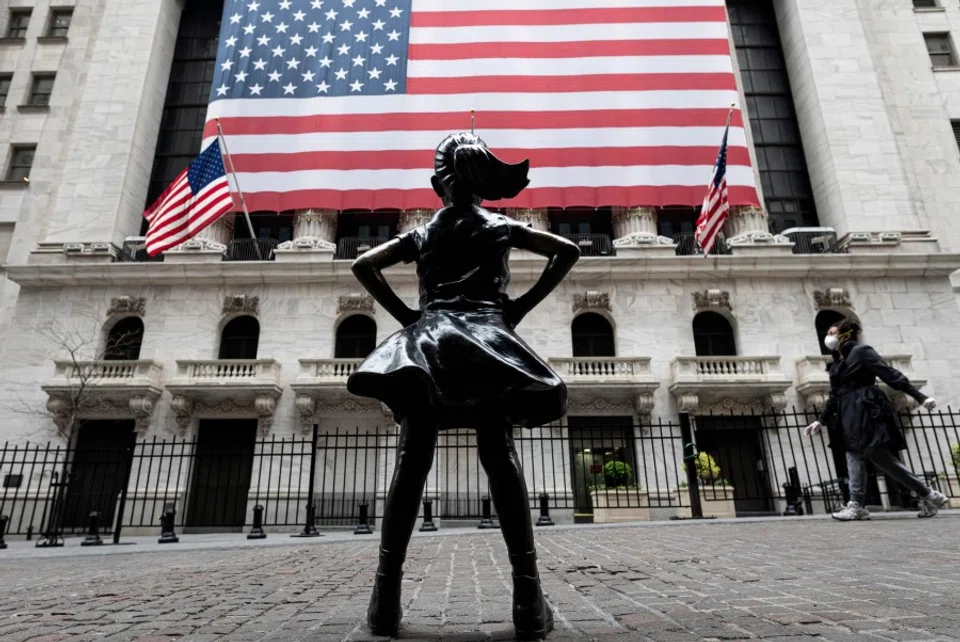Will the pandemic undermine the long-term leadership capability of the US?
With the coronavirus rampaging through the West, especially the US, some people think that this might signal the start of a decline in the leadership status of the US, with China ready to step up in its place. Chinese professor Yu Zhi does not agree.

Since March, the coronavirus has spread through Europe and the US, with the latter hit especially hard. One view is that the US has mishandled the outbreak; not only has it not provided leadership to the world, but it has also been hit the hardest. Its standing and power have suffered tremendously and its capability as a world leader after the pandemic will be shaken. It may even start to give way to China, which has done well in handling the outbreak and has provided aid to other countries.
This view is captured in an essay by Kurt Campbell and Rush Doshi in US magazine Foreign Affairs, which raises the possibility and conditions for such a scenario to take place. The internet community in China has also embraced the view indiscriminately, taking for granted that it will happen, believing the pandemic will lead to the de-Americanisation of the world.
This is a misreading of the situation. The US's mishandling of the outbreak is a problem with the government, not the system, and its prestige and leadership capabilities will not be seriously weakened by the outbreak.
Trump administration to blame
The poor response by the Trump administration is indeed an important reason why the US has been hit the worst by the coronavirus. Media reports, criticisms by the opposition, interviews with experts and academics, have all offered detailed analyses of the root causes: carelessness and underestimating the infectiousness and damage of the virus; focusing on preventive measures against China, while not guarding against imported cases from Europe, so that the "Maginot Line" (a defence barrier that gives a false sense of security) was breached from the back; and focusing too much on political tussles, calling warnings about the outbreak as political manoeuvring by the opposition. Also, apart from the government's mishandling, the carelessness and lack of cooperation among its people is a key factor.

However, the US government's mishandling boils down to the Trump administration's lack of knowledge and failure to act, which cannot be attributed to a failure of the US system. US political academic Francis Fukuyama has also pointed this out. On the contrary, the strength of the US system lies in its ability to promptly correct itself.
A country's system is a determining factor in its long-term survival or otherwise.
Now, the pandemic has drawn the attention of the entire US, which is in crisis mode. Outbreak control measures have been put in place, including increased testing and isolation, breaking contact with the outside world, and stepping up production of outbreak supplies. With these measures and the US's strong medical technology, beating the coronavirus is a matter of time.
China's systemic issues
In comparison, one of the reasons (but not the only reason) why the initial outbreak went out of control in China was that the punishment of eight "whistleblower" doctors was carried out to maintain social stability, with an aim to safeguard the system. The outcome of official investigations into the case of Dr Li Wenliang, as well as outbreak measures in some places that went against the principles of lawfulness, showed deep-rooted, stubborn systemic problems that have not been scrutinised and addressed.
A country's system is a determining factor in its long-term survival or otherwise. From that perspective, the US's leading position will not be weakened by its mishandling of the coronavirus outbreak, much less would it give way to China.
US credibility will not be seriously damaged by the pandemic
The position of the US as a global leader manifests itself through politics, the military, and the economy. It is realised through its own actions and those with its allies, as well as its strong leadership position in international organisations such as the UN Security Council, World Bank, International Monetary Fund, and the World Trade Organisation. And while the US does play an important role in environmental, cultural and social issues such as climate change, cultural education, and public health, its leadership in these areas is weaker, as is its role in the relevant international organisations.
In particular, many countries (including but not limited to developed Western countries) feel that the spread of this global pandemic has a lot to do with the World Health Organisation (WHO), especially its director-general, Tedros Adhanom Ghebreyesus. They criticise the WHO and Dr Tedros for their slow response to the outbreak and its delay in declaring it a Public Health Emergency of International Concern. Even then, the WHO did not recommend (and even objected to) limiting travel to China, and played no small part in the spread of the coronavirus in Europe, and its eventual impact on the US.

Over a million people worldwide have called for Tedros to step down, with Trump recently trading barbs with Tedros and halting US funding to the WHO. US Senate leaders made it clear that Tedros' stepping down and WHO funding were directly linked. Some Western countries, including the US, think the problem lies with China's influence over the WHO and Tedros, even linking it to the amount of aid China gives to the WHO. The US further declared that it would investigate the respective links between the WHO and Tedros with China.
These allegations by the Western countries would hurt China's international reputation. Conversely, they could offset the negative impact the pandemic has on the leadership position of the US, or even boost the US's position and increase its influence within the WHO.
The US's ability to lead will not be weakened due to the pandemic
It is not yet possible to accurately assess the negative impact of the pandemic on the US economy. But as mentioned, a pandemic is a natural disaster, unlike the 2008 financial crisis or the Great Depression of 1929, it is not caused by problems inherent in the economic system. The US economy has been doing well in the past few years; the foundation is good and the US is technologically advanced. Even if the pandemic creates greater short-term impact, its long-term economic impact would probably be less than that of the Great Depression. In fact, even with the two economic crises which had arisen due to problems within the US's economic system, the leadership capability of the US was not undermined.
Furthermore, this pandemic has also hit all the world's major economies, including China, with comparable force; and many of these economies are weaker than the US in terms of economic strength.
Hence, it is a classic case of misjudgment to think that since the US temporarily mishandled the outbreak, and since China effectively controlled the epidemic in the later stages, the US leadership will suffer a blow or that the world will undergo "de-Americanisation". Neither would it be right to believe that China will take the opportunity to take the place of the US, or that China's leadership capability will rise in comparison to the US.
On the contrary, there is increased criticism among Western countries against China and growing calls for accountability. China should instead watch out for the possible risk of decoupling from the West, and the "de-sinicisation" of global supply chains.





![[Photos] Fact versus fiction: The portrayal of WWII anti-Japanese martyrs in Taiwan](https://cassette.sphdigital.com.sg/image/thinkchina/3494f8bd481870f7c65b881fd21a3fd733f573f23232376e39c532a2c7593cbc)